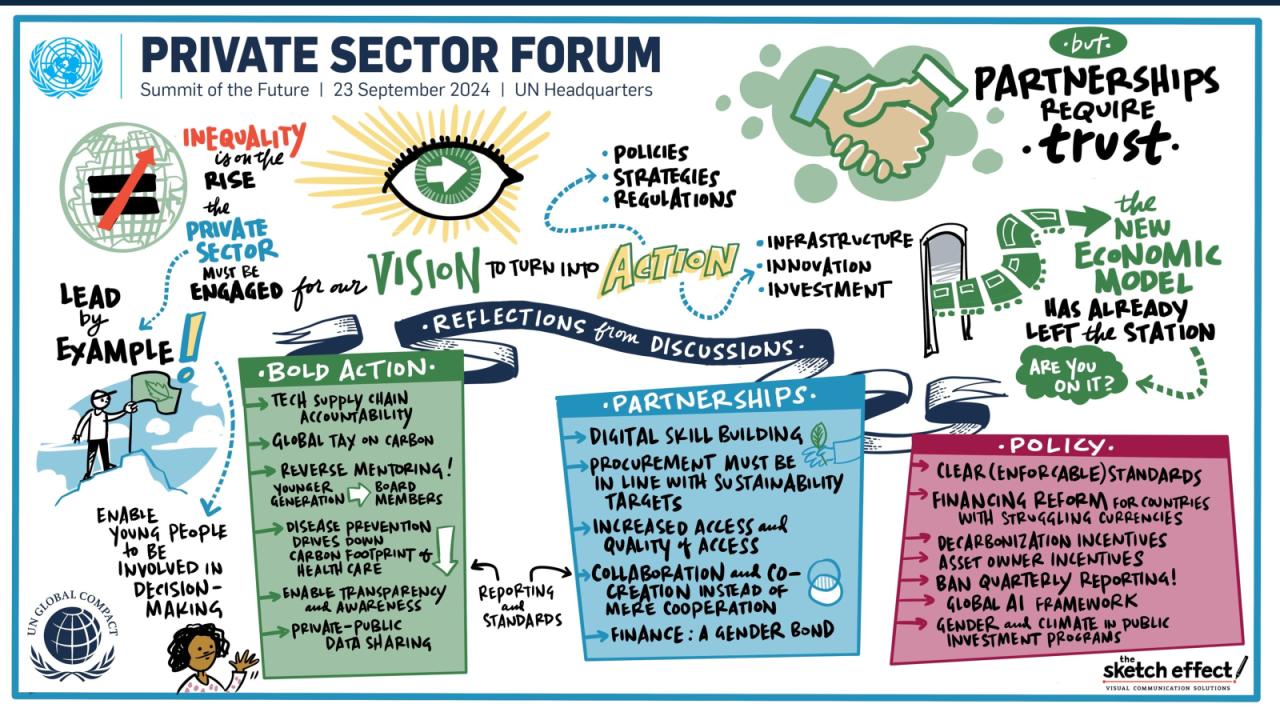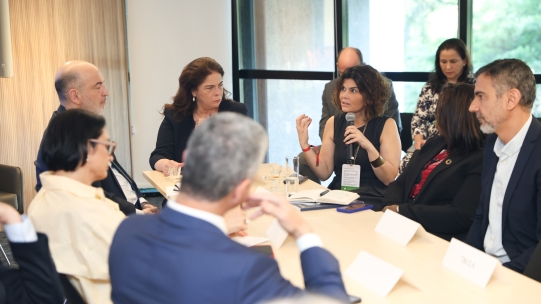Accelerating a Sustainable Future
Poverty, climate change, armed conflict, disease and other ills abide by no borders, posing a long-term threat to global business and commerce as surely as they do for those living now on the edge of catastrophe.


Poverty, climate change, armed conflict, disease and other ills abide by no borders, posing a long-term threat to global business and commerce as surely as they do for those living now on the edge of catastrophe.
Confronting these problems is too big a task for the United Nations and its Member States alone. Business must come off the sidelines. Just as the private sector rallies to action during economic upheaval, wartime or in a pandemic, so must it now – for its own best interest – join with Government leaders to build a world that’s prosperous, peaceful and protected from environmental disaster.
The Private Sector Forum at the UN’s Summit of the Future provided the venue for business leaders to demonstrate leadership. Top CEOs and investors, Government officials, public interest advocates and others gathered at the United Nations in New York to share their assessment of global perils and how best to meet them.
The private sector has powerful incentives to get involved. Business prospers from operating environments that are stable and peaceful. Global business has been fighting headwinds caused by supply chain disruptions, climate change, political upheaval and technology disruptions. Most CEOs say their job now requires them to address multiple global and societal challenges. Top business leaders have the ability to drive sustainability within their organizations, and set an example for others to follow.
Their support is needed and welcome. The entrepreneurs who create new industries and technologies, the leaders of corporations who trade across the globe, the farmers who feed us, and even the shopkeepers who humbly serve small communities – all have skills, resources and experience in overcoming obstacles and finding paths to success. They can be powerful allies in achieving the 17 Sustainable Development Goals.
The SDGs are in essence a blueprint for a better world. None are easy to achieve. Ending hunger, ensuring universal access to health and education, establishing gender equality for women and girls, providing clean water and better economic opportunity for all – these and the other SDGs are the biggest challenges of our time. Just 17% of the SDGs are on track to be completed by the target year of 2030, the UN reported in June, making the need for business participation more urgent than ever. The need for private investment is particularly acute in developing countries, where the shortfall to achieve the SDGs is estimated at $30 trillion.
The private sector has to dramatically step up its efforts for the goals to be met, but with 17 goals, how best to concentrate its efforts? The UN Global Compact has identified three transitions that can serve as keys to unlocking progress: digitalization, energy transition and decent work and social protection. In an effort to fast-track these transitions, the Global Compact researched business conditions in five countries – India, South Africa, Egypt, Brazil and Angola. The resulting report, Policy Enablers for Private Sector SDG Action, identifies issues with infrastructure, financing, regulations, legacy industries and workforce training that are impeding progress. It recommends a series of policy changes, both for the five countries and for Governments more broadly, that national leaders can adopt to boost private sector participation in accelerating the SDGs. These include: sending clear demand signals; de-risking investments to attract private financing; ensuring regulatory coherence and aligning disclosure requirements; building plans and programmes that support long-term goals; empowering workers through skills development and lifelong learning pathways; and strengthening governance and transparency.
On the sidelines of the UN General Assembly in September, the Summit of the Future and the Private Sector Forum will set the stage for decisive action.
At the Summit of the Future, world leaders adopted the Pact for the Future reaffirming their commitment to multilateralism and international cooperation. The Pact for the Future includes a fresh commitment to achieving the Sustainable Development Goals and supporting the UN Charter.
We can only accomplish our goals through bold leadership, inclusive governance and strong political will – from Governments, business and civil society. We need robust support from business leaders to ensure that the ambitions of the Pact are translated into meaningful change across sectors. This is not just an ask, but an opportunity: a strong and inclusive multilateral system is critical to a healthy, sustainable global economy.
This year’s Private Sector Forum focused on three key areas:
Accelerating Action for SDGs: One of the most urgent tasks before global leaders now is to accelerate tangible action on the Sustainable Development Goals. As noted previously, just 17% are on track – and for more than a third, progress has either stalled out or is regressing amid geopolitical tensions, the lingering aftermath of Covid-19 and other issues. The UN Global Compact launched Forward Faster in September 2023 to light a fire under the private sector, whose support is critical to achieving the SDGs. Forward Faster challenges businesses to take tangible action on the five areas that have the power to accelerate progress on all 17 of the SDGs – gender equality, climate action, living wage, water resilience and finance and investment.
Revolutionizing Sustainable Finance: Banks, insurance companies, pension funds, corporations, asset managers and other financial gatekeepers control an estimated USD $200 trillion in investment capital globally. This money can be invested profitably toward achieving sustainable development, but many investors are reluctant to commit capital to developing economies and new technologies that need it most. Accelerating Innovation in Sustainable Finance, a report by the UN Global Compact with the UN Department of Economic and Social Affairs, identifies the roadblocks to sustainable finance and how to take action.
Responsible Digital Transformation: Technology – and in particular Artificial Intelligence – can potentially turbocharge progress toward the SDGs. Generative AI itself is expected to trigger a new information age, giving people access to mountains of data that can be comprehensively analyzed to come up with solutions to the thorniest of problems – including helping the private sector slip past the headwinds that have held back progress on sustainable development. But if Gen AI is a genie, it is an untested one. Inclusivity and shared access to computing resources and robust data frameworks are essential to ensure that AI development benefits all stakeholders. The private sector will play a crucial role in fostering AI talent and ensuring ethical AI governance. Gen AI for the Global Goals, a report by Accenture and the UN Global Compact, identifies and recommends ways to guard against the risks AI poses, including to cyber security, privacy and cultural diversity.
Both public and private leaders shared their ideas for bold actions, partnerships and policy opportunities to drive a more sustainable future.


